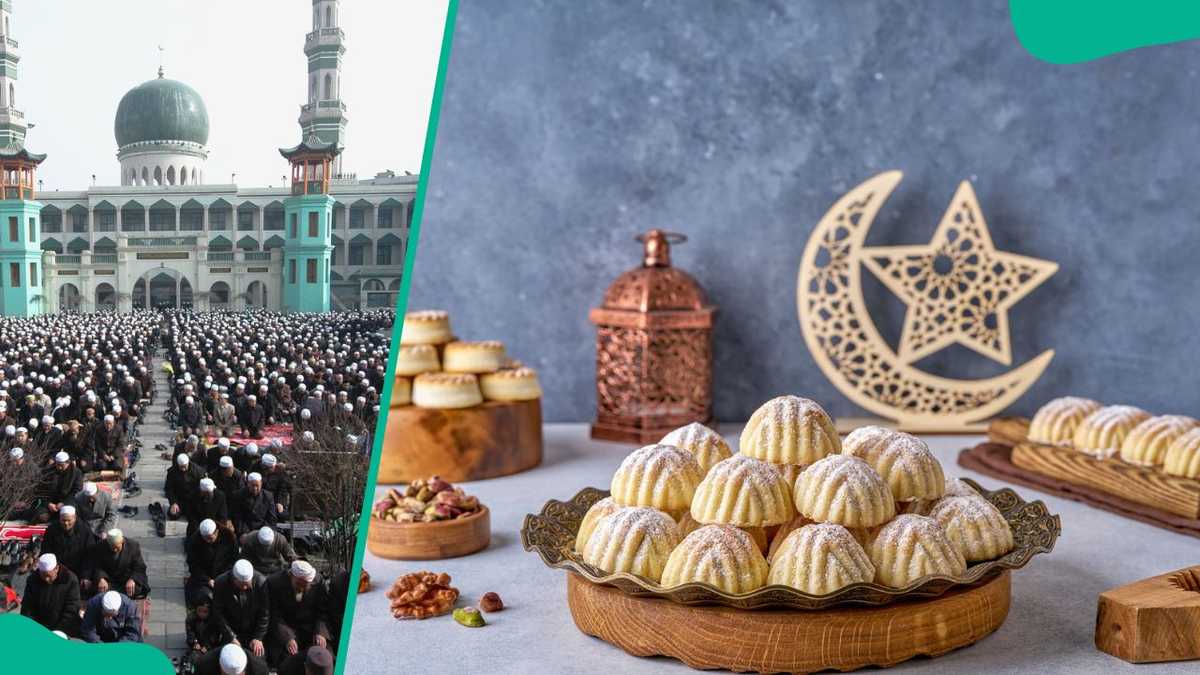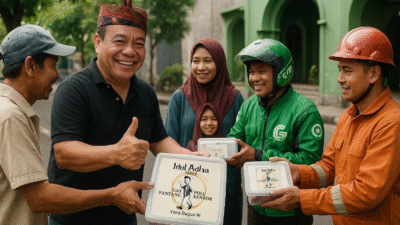What is Eid al-Adha, and what is the reason for celebrating it? Eid al-Adha, often referred to as the
“Festival of Sacrifice,”
one of the highest
major celebrations in the Muslim lunar schedule
Honored globally by Muslims, this religious celebration
honors Prophet Ibrahim’s (Abraham) readiness to sacrifice his son Ismail (Ishmael)
In compliance with God’s directive.
Key takeaways
- Honors Prophet Ibrahim’s readiness to sacrifice his son as an act of obedience to God.
-
Celebrated globally by Muslims, in harmony with the
Hajj pilgrimage.
-
Animals are sacrificed
, with the meat being distributed among family, friends, and those in need. -
Emphasises
donating to those in need
.
What is Eid al-Adha, and what makes this celebration significant?
Eid al-Adha, often referred to as the “Feast of Sacrifice,” stands out as one of the major Islamic celebrations. This festival is observed globally to honor the devotion shown by Prophet Ibrahim (Abraham), who was prepared to offer his son, Ishmael, as a sign of compliance with Allah’s directive.
It has strong ties to Hajj, the yearly journey to Mecca, which stands as one of the Five Pillars of Islam.
Why do we observe Eid al-Adha in Urdu?
While millions of Muslims take part in the Hajj pilgrimage, those unable to join mark Eid al-Adha as an occasion to uphold the values of devotion and self-sacrifice.
Importance of Eid al-Adha
- Eid al-Adha holds great importance for Muslims as it embodies their steadfast commitment to faith and obedience towards God.
- This is a period for introspection, thankfulness, and strengthening communal ties.
- Muslims recall the tale of Prophet Abraham’s sacrifice, serving as an example of self-sacrifice, faith, and prioritizing divine orders over one’s own wishes.
- The festival also emphasises charity, as the meat from the sacrificed animals is distributed among family, friends, and the less fortunate.
What are some ways Eid al-Adha is observed?
Eid al-Adha is observed through various ceremonies and customs. Here’s how one can celebrate Eid al-Adha:
- Muslims start their day with special Eid prayers held either at mosques or in outdoor prayer areas.
- During the service (khutbah), attendees are reminded about the importance of belief and self-sacrifice.
- The sacrifice of a permissible animal, like a sheep, goat, cow, or camel, known as Qurbani, is carried out.
- The meat is divided into three parts: one for the family, one for relatives and friends, and one for the needy.
- Families gather for festive meals, exchange gifts, and visit loved ones.
- Eid al-Adha food plays a central role, with traditional dishes like biryani, kebabs, roasted meats, curries, and sweet delicacies such as baklava and sheer khurma, making the celebration joyful and flavorful.
10 Sentences on Eid ul-Adha
Understanding how to celebrate Eid ul-Adha helps us appreciate its true essence. This sacred festival is a time of faith, sacrifice, and community. Here are the sentences on Eid al-Adha
- Eid al-Adha is one of the two major Islamic festivals Muslims celebrate.
- It is also known as the “Festival of Sacrifice.”
- The festivities honor the faith and dedication of Prophet Abraham.
- On Eid morning, Muslims pray special prayers at the mosque.
- An act of offering an animal for ceremonial sacrifice serves as a sign of dedication.
- The meat is shared with family, friends, and those in need.
- Eid al-Adha is an occasion for coming together with family and enjoying special feasts.
- This serves as a reminder of the principles of generosity, thankfulness, and empathy.
- The festivities align with the conclusion of the Hajj pilgrimage.
- People across the globe observe Eid al-Adha with happiness and contemplation.
What is the particular message for Eid al-Adha?
Eid al-Adha conveys a distinctive message centered around faith, sacrifice, and empathy. This observance underscores the significance of prioritizing divine wishes over individual aspirations, much like Prophet Ibrahim did. Additionally, it highlights acts of generosity, benevolence, and solidarity within the Muslim community.
What is the ethical importance of Eid al-Adha?
The ethical importance of Eid al-Adha centers around teachings of altruism, submission to God, and empathy towards others. This celebration encourages followers to assist those in need, distribute their good fortune, and stay true to their convictions.
What is the significance of Eid al-Adha?
Eid al-Adha embodies the lesson of testing and fortifying one’s belief, much like Prophet Ibrahim’s faith was put to the test. Additionally, this celebration fosters feelings of thankfulness, modesty, and generosity via the act of Qurbani (sacrificial offering).
How do you wish you and your family a blessed Eid al-Adha?
You may express warm wishes to your family for a blessed Eid al-Adha using sentiments like,
Let this Eid al-Adha usher in peace, happiness, and abundant blessings for you and those dear to you. Eid Mubarak!
To enhance its significance, include Eid al-Adha gift suggestions like customized presents, confections, or cultural artifacts that embody affection and thoughtfulness.
What does the term Qurbani (sacrifice) signify?
Qurbani denotes the ceremonial sacrifice of an animal carried out during Eid al-Adha. This act signifies the readiness of Muslims to relinquish something precious for the sake of Allah, mirroring the devotion shown by Prophet Ibrahim when he was willing to sacrifice his son in compliance with divine commandment.
Is it possible to observe Eid al-Adha even if I do not undertake Hajj?
Absolutely, you can still observe Eid al-Adha without undertaking Hajj. This joyous occasion is meant for all followers of Islam, regardless of their location—be it in Mecca or elsewhere. The true spirit of Eid al-Adha lies in commemorating the devotion shown by Prophet Ibrahim and adhering to God’s directives.
What is the most appropriate method for carrying out Qurbani?
Performing Qurbani most effectively involves adhering to the directives outlined in Islamic law, making sure that the livestock is permissible (halal), fit, and treated kindly and honorably throughout the process. Additionally, distributing portions of the meat among relatives, acquaintances, and individuals facing hardships serves as a form of charitable giving.
Facts about Eid al-Adha
The list below aims to highlight key aspects of Eid al-Adha:
- The celebration of Eid al-Adha takes place on the 10th day of Dhul Hijjah as per the Islamic lunar calendar. Dhul Hijjah marks the last month of this religious timekeeping system.
- Muslims get ready for their prayers by doing Wudhu and reciting the Fajr prayer. Wudhu involves cleansing oneself as part of the preparatory rituals before praying.
- Large congregations offer prayers to symbolize solidarity, and these prayers comprise two Rakats. A Rakat denotes a single unit within Islamic prayer rituals.
- A sermon follows after the prayer and is usually compulsory. The Khutba lasts between 15 to 20 minutes.
- After the prayers, the Qurbani ritual follows. It entails sacrificing a goat, a cow or a buffalo. The meat is usually divided into three portions.
- The distribution of the three parts is organized thusly: the initial portion is allocated to their family, the subsequent section is designated for their neighbors, and the final piece is intended for those less fortunate.
Eid al-Adha is an annual Islamic celebration that honors the tale of Prophet Ibrahim’s willingness to sacrifice his son as an act of obedience towards God. This occasion serves as a moment for expressing devotion, making sacrifices, showing appreciation, and fostering unity among believers who gather to recount this narrative and distribute their good fortune amongst those less fortunate.
IndoNEWSian.com.ng has recently released an article detailing the guidelines, customs, traditions, and regulations surrounding Eid al-Adha. Also known as the Festival of Sacrifice, this significant Islamic celebration holds great importance.
Although most Muslims follow the guidelines for prayers and animal sacrifices during Eid al-Adha, non-Muslim guests are not required to adhere to all these rules. For additional information, click on the provided link above!



















